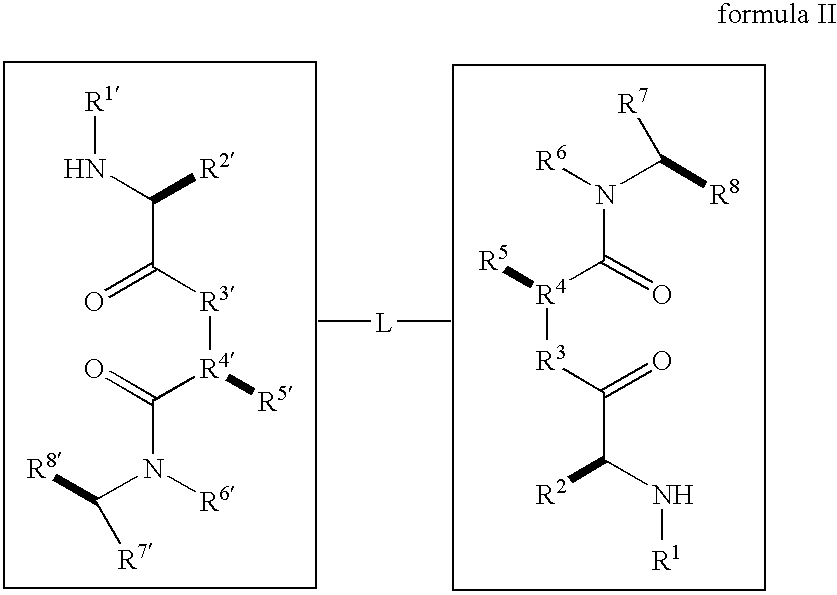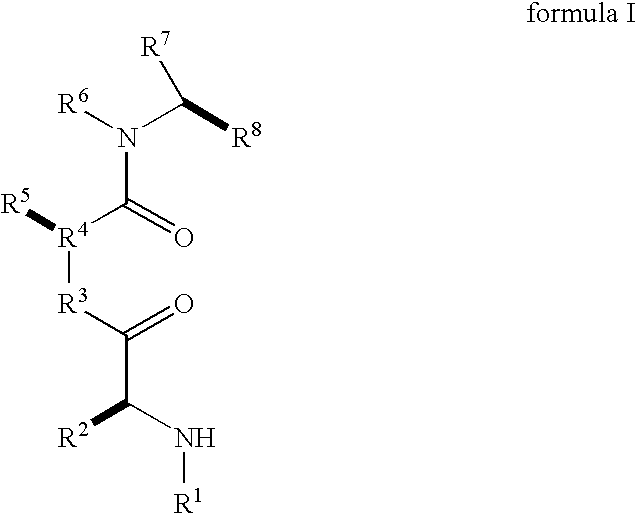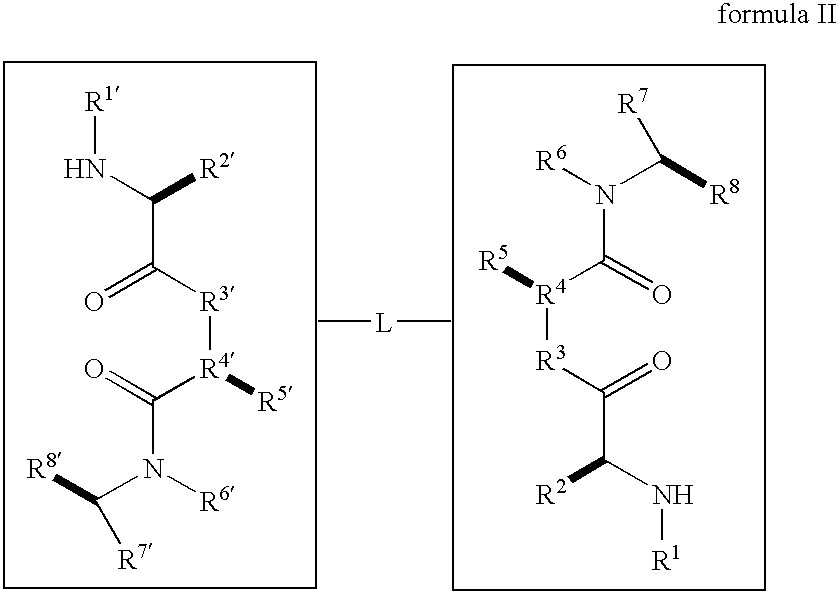Dimeric small molecule potentiators of apoptosis
a small molecule and potentiator technology, applied in the field of dimeric small molecule potentiators of apoptosis, can solve the problems of severely limited physicochemical properties of prior art materials, and achieve the effects of less activity, reduced inhibition of caspases, and exceptional potency
- Summary
- Abstract
- Description
- Claims
- Application Information
AI Technical Summary
Benefits of technology
Problems solved by technology
Method used
Image
Examples
example 1
In Vitro IAP (BIR) Binding / Interaction Assay
[0145]Interaction between mimetics and IAPs was examined by GST-mediated pull-down assays. Approximately 0.4 mg of a recombinant IAP fragment (second and third BIR motifs of XIAP) is bound to 200 ml of glutathione resin as a GST-fusion protein and incubated with 0.5 mg of radiolabeled mimetics at room temperature. After extensive washing with an assay buffer containing 25 mM Tris, pH 8.0, 150 mM NaCl, and 2 mM dithiothreitol (DTT), the complex is eluted with 5 mM reduced glutathione and visualized by SDS-PAGE with Coomassie staining. This assay demonstrates that the tested mimetics specifically bind IAP.
example 2
High-Throughput In Vitro Fluorescence Polarization Binding Assay
[0146]
Sensor:Rhodamine-labeled mimetic(final conc. = 1-5 nM)Receptor:Glutathione-S-transferase / BIR2,3 fusion protein(final conc. = 100-200 nM)Buffer:10 mM HEPES, 10 mM NaCl, 6 mMmagnesium chloride, pH 7.6[0147]1. Add 90 microliters of mimetic / BIR2,3 mixture to each well of a 96-well microtiter plate.[0148]2. Add 10 microliters of test compound per well.[0149]3. Shake 5 min and within 5 minutes determine amount of fluorescence polarization by using a Fluorolite FPM-2 Fluorescence Polarization Microtiter System (Dynatech Laboratories, Inc).
Tested mimetics significantly and specifically bind the IAP BIR2,3 domain.
3. High throughput solid phase mimetic-BIR2,3 binding / binding-interference assay.
A. Reagents:[0150]Neutralite Avidin: 20 μg / ml in PBS.[0151]Blocking buffer: 5% BSA, 0.5% Tween 20 in PBS; 1 hour at room temperature.[0152]Assay Buffer: 100 mM KCl, 20 mM HEPES pH 7.6, 1 mM MgCl2, 1% glycerol, 0.5% NP-40, 50 mM b-merc...
example 4
Hela Cell Extracts: Radiolabeled Procaspase-3 Activation Assay
[0172]20 mg S-100 extracts of HeLa cells were incubated alone (Control), or with mimetics (50 nM) nM, or with 30-1000 mM of N-terminal Smac peptides in different lengths. The reactions were carried out with the addition of 1 mM dATP, 1 mM additional MgCl2, 0.2 mg / ml horse heart cytochrome c, and 1 ml of in vitro translated, 35S-labeled caspase-3 in a final volume of 20 ml. The reaction mixtures were incubated at 30° C. for 1 hr followed by electrophoresis on a 15% PAGE gel. The gel was subsequently transferred onto a nitrocellulose filter and exposed to a phosphoimaging cassette. Mimetics and Smac fragments significantly promoted activation of procaspase-3, whereas negative control Smac-7R did not.
PUM
| Property | Measurement | Unit |
|---|---|---|
| pH | aaaaa | aaaaa |
| pH | aaaaa | aaaaa |
| pH | aaaaa | aaaaa |
Abstract
Description
Claims
Application Information
 Login to View More
Login to View More - R&D
- Intellectual Property
- Life Sciences
- Materials
- Tech Scout
- Unparalleled Data Quality
- Higher Quality Content
- 60% Fewer Hallucinations
Browse by: Latest US Patents, China's latest patents, Technical Efficacy Thesaurus, Application Domain, Technology Topic, Popular Technical Reports.
© 2025 PatSnap. All rights reserved.Legal|Privacy policy|Modern Slavery Act Transparency Statement|Sitemap|About US| Contact US: help@patsnap.com



